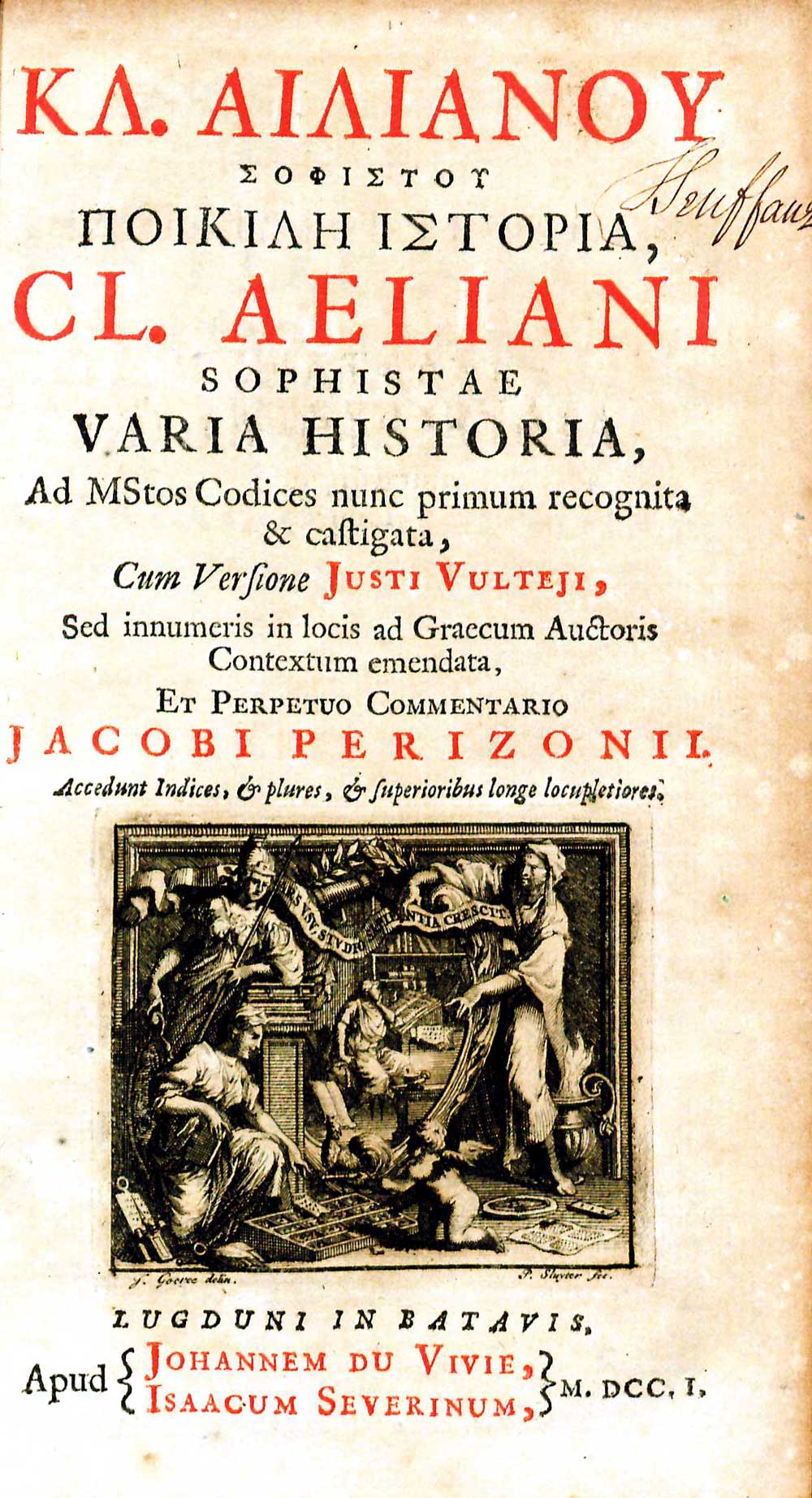Difference between revisions of "Kl. Ailianou Sophistou Poikilē Historia"
| Line 14: | Line 14: | ||
|set=1 | |set=1 | ||
}} | }} | ||
| + | Aelian lived in the 2nd and 3rd centuries CE (roughly 165-230 CE). He was a freedman born in a hillside town near Rome who learned Greek from a sophist. <ref>[http://www.oxfordreference.com/view/10.1093/acref/9780192801463.001.0001/acref-9780192801463-e-35 "Aelian"] in ''Oxford Dictionary of the Classical World'', ed. by John Roberts (Oxford: Oxford University Press, 2007).</ref> Aelian became a sophist himself – a title which originally indicated that a person had a particular skill and therefore wisdom, but came to refer to a personal teacher who traveled from town to town preparing men from wealthy families for public success. <ref>[http://www.oxfordreference.com/view/10.1093/acref/9780199548545.001.0001/acref-9780199548545-e-2770 "Sophist”] in ''The Oxford Companion to Classical Literature'', ed. by M.C. Howatson (Oxford: Oxford University Press, 2011).</ref> <br /> | ||
| + | <br /> | ||
| + | Aelian’s ''Varia Historia'', or ''Historical Miscellany'', is a collection of various stories and anecdotes. <ref>Dilts, Mervin R. “The Manuscript Tradition of Aelian’s Varia Historia and Heraclides’ Politiae,” ''Transactions and Proceedings of the American Philological Association'' 96, (1965): 57.</ref> Even in modern times, Aelian’s work and details are viewed with skepticism. One classicist even went so far as to say “Aelian’s aim is to supply well-turned exempla, and he seems to have relied uncritically upon whatever summary he found.” <ref>Carawan, Edwin. “Pericles the Younger and the Citizenship Law,” ''The Classical Journal'' 103, no. 4 (Apr., - May, 2008): 383-406.</ref> Despite reservations about his choice of content, Aelian was widely respected throughout the centuries for his simple, clear writing and use of pure Attic language. <ref>[http://www.oxfordreference.com/view/10.1093/acref/9780192801463.001.0001/acref-9780192801463-e-35 "Aelian"] in ''Oxford Dictionary of the Classical World'', ed. by John Roberts (Oxford: Oxford University Press, 2007).</ref> | ||
| + | |||
==Evidence for Inclusion in Wythe's Library== | ==Evidence for Inclusion in Wythe's Library== | ||
Revision as of 16:43, 13 January 2014
Kl. Ailianou Sophistou Poikilē Historia = Cl. Aeliani Sophistae Varia Historia: ad Mstos Codices Nuc Primum Recognita & Castigata: cum Versione Justi Vulteji, Sed Innumeris in Locis ad Graecum Auctoris Contextum Emendata et Perpetuo Commentario Jacobi Perizonii: Accedunt Indices & Plures & Superioribus Longe Locupletiores
by Aelian
| Kl. Ailianou Sophistou Poikilē Historia | |
|
Title page from Kl. Ailianou Sophistou Poikilē Historia, George Wythe Collection, Wolf Law Library, College of William & Mary. | |
| Author | Aelian |
| Published | Lugduni in Batavis: Apud Johannem du Vivie, Isaacum Severinum |
| Date | 1701 |
| Language | Latin |
| Volumes | 1 volume set |
Aelian lived in the 2nd and 3rd centuries CE (roughly 165-230 CE). He was a freedman born in a hillside town near Rome who learned Greek from a sophist. [1] Aelian became a sophist himself – a title which originally indicated that a person had a particular skill and therefore wisdom, but came to refer to a personal teacher who traveled from town to town preparing men from wealthy families for public success. [2]
Aelian’s Varia Historia, or Historical Miscellany, is a collection of various stories and anecdotes. [3] Even in modern times, Aelian’s work and details are viewed with skepticism. One classicist even went so far as to say “Aelian’s aim is to supply well-turned exempla, and he seems to have relied uncritically upon whatever summary he found.” [4] Despite reservations about his choice of content, Aelian was widely respected throughout the centuries for his simple, clear writing and use of pure Attic language. [5]
Evidence for Inclusion in Wythe's Library
Description of the Wolf Law Library's copy
Bound in late eighteenth century full calf with raised bands. Spine in six panels and morocco title label to second panel, contrasting morocco volume label to third, remaining panels with gilt central lozenge and volute corner pieces. Has gilt rolled border to covers with all edges marbled and blue paste endpapers. Contains previous owner's name to title and first page of text of volumes two and three. Additional engraved title, title of main work in red and black. Purchased from Temple Rare Books.
View this book in William & Mary's online catalog.
References
- Jump up ↑ "Aelian" in Oxford Dictionary of the Classical World, ed. by John Roberts (Oxford: Oxford University Press, 2007).
- Jump up ↑ "Sophist” in The Oxford Companion to Classical Literature, ed. by M.C. Howatson (Oxford: Oxford University Press, 2011).
- Jump up ↑ Dilts, Mervin R. “The Manuscript Tradition of Aelian’s Varia Historia and Heraclides’ Politiae,” Transactions and Proceedings of the American Philological Association 96, (1965): 57.
- Jump up ↑ Carawan, Edwin. “Pericles the Younger and the Citizenship Law,” The Classical Journal 103, no. 4 (Apr., - May, 2008): 383-406.
- Jump up ↑ "Aelian" in Oxford Dictionary of the Classical World, ed. by John Roberts (Oxford: Oxford University Press, 2007).
